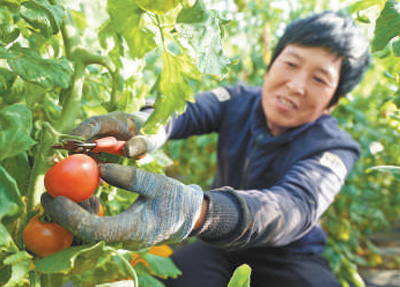Protected vegetable cultivation brings better lives to people in county in N China's Hebei

Photo shows vegetable greenhouses near Xingzhou village, Datun township, Luanping county, Chengde city, north China's Hebei Province, Jan. 25. (Photo/Liang Zhiqing)
Luanping county in Chengde city, north China's Hebei Province, has given its residents better lives by promoting protected cultivation of vegetables.
More than 4,000 local villagers have found jobs, thanks to the continually expanding area of vegetables grown under protected cultivation in the county.
Ma Guilan, a 63-year-old resident of Xingzhou village, Datun township, Luanping county, and her 65-year-old husband Zhu Fenglong now earn a combined monthly salary of 9,000 yuan ($1,328.4) by tending vegetables in six greenhouses for Luanping Xinshuo Agricultural Development Co., Ltd., an agriculture company based in their village.
The couple used to grow corn in their three mu (0.2 hectares) of farmland, which only brought them an income of 2,000 yuan a year, no matter how hard they worked in the fields all the year round, according to Ma.
Since they transferred their land use rights to a greenhouse vegetable grower, they have received 4,000 yuan a year in rent for their land, and worked as greenhouse keepers for the company.
Over the past few years, the couple have not only built a new house in Xingzhou village, but also bought a house and a car for their son in the county seat.
"Our lives are getting better and better," Ma said to People's Daily, with a big smile on her face.
Luanping county has paired up with People's Daily under China's "pairing assistance" program, a national strategy that was launched to channel financial and personnel support to less developed regions around the country.
With targeted assistance from People's Daily, the county has intensified efforts to build vegetable industrial parks in recent years, said Zhang Lei, an official dispatched to help boost the development of Luanping county and who now serves as the deputy head of the county.
By introducing large-scale vegetable growers and companies into vegetable industrial parks and promoting a business model that features cooperation among companies, vegetable planting bases, relevant organizations and farmers, the county has continuously expanded the area of vegetables grown under protected cultivation, according to Zhang, who revealed that the county now has 11,000 mu of such vegetables.
"Luanping county is blessed with exceptional natural conditions for vegetable farming. It has a mild climate and abundant water resources. It is also close to Beijing and Tianjin, which means low transport costs. The unique location advantage is favorable for large-scale development of protected agriculture," Zhang explained.
In addition to vegetables, Luanping county has also made great efforts to promote the production of edible fungi.
"Vegetable greenhouses require fertile soil and adequate light. In a bid to increase farming efficiency, since 2020, we have built factory-like facilities to develop protected agriculture in areas where the soil is quite poor and there is a lack of light. We have introduced rare varieties of edible fungi," said Lyu Lianbao, deputy head of Luanping county's bureau of agriculture and rural affairs.
There are six edible fungi industrial parks with factory-like facilities in Luanping county, according to Lyu.
Rare varieties of edible fungi can only grow well under certain conditions, and if the temperature and soil’s water content are kept within certain ranges.

Photo taken on Jan. 25 shows a villager picking tomatoes in a vegetable greenhouse in Datun township, Luanping county, Chengde city, north China's Hebei Province. (Photo/Shao Yuzi)
"Manual work is costly, and precision cannot be guaranteed, which would affect the growth and quality of the fungi," said Jiang Haitao, an employee of an agriculture company that runs an edible fungi production base with factory-like facilities in Anchungoumen township of Luanping county.
Jiang, who was on duty during the Spring Festival holiday this year, has taken care of dozens of workshops in the base, thanks to the help of his company's smart agriculture platform.
With the click of a mouse, Jiang can carry out remote regulation of the temperature, humidity, carbon dioxide concentrations, as well as other factors in the workshops in real time.
According to Jiang, the local government has granted his company nearly 20 million yuan in funds for agriculture-related projects. With the money, the company has brought comprehensive upgrades to the software and hardware of its workshops and built a smart agriculture platform, achieving precision planting powered by 5G network and digital technologies.
The company's edible fungi production base in Anchungoumen township is also a demonstration industrial park of edible fungi cultivation featuring precision planting powered by 5G network and digital technologies in Hebei Province.
So far, the company has built 43 smart workshops, 23 of which are being used for the production of a variety of edible fungi named Oudemansiella raphanipies, Jiang said. The 23 workshops boast a daily output of more than 1,500 kilograms, and form a large production base of Oudemansiella raphanipies in northern China, according to Jiang.
Starting this year, 5G networks and relevant smart technologies will be gradually adopted by all protected agriculture industrial parks in Luanping county, said Lyu.
Today, Luanping county supplies about 60 tonnes of fresh vegetables to its neighboring cities, Beijing and Tianjin, on a daily basis. In 2022, the county produced about 35,000 tonnes of vegetables grown under protected cultivation, of which about 22,000 tonnes were directly supplied to Beijing and Tianjin.
Vegetables produced in Xingzhou village can be transported to Beijing in three hours, according Luo Dongyang, a refrigerated van driver who transports fresh vegetables from the greenhouses of Luanping Xinshuo agricultural development Co., Ltd. in Xingzhou village to Beijing.
This kind of efficiency couldn't have been possible without the rapid development of cold-chain logistics and transportation services in the county.
"We have encouraged several leading modern agriculture companies to develop cold-chain logistics and transportation services in an effort to improve the value added of vegetables, so that fresh vegetables produced in Luanping can reach the dining tables of families in Beijing and Tianjin on the same day they are picked," Lyu told People's Daily.
Over the past few years, Luanping county has vigorously supported enterprises in building fresh-keeping storehouses with a capacity of more than 100 tonnes, said Lyu, adding that the local government has reimbursed companies for 40 percent of the total cost of each new fresh-keeping storehouse.
"We have built 12 fresh-keeping storehouses, which cover an area of 1,150 square meters and can store 650 tonnes of vegetables," said Li Jianpo, deputy general manager of Luanping Xinshuo agricultural development Co., Ltd.
As of the end of 2022, Luanping county had 124 storage and fresh-keeping facilities.
Photos
Related Stories
- China's Hebei to invest 103.5 bln yuan in transportation construction
- People visit scenic spot in north China's Hebei
- Villagers in north China's Hebei embrace prosperity thanks to red lantern manufacturing
- Bicycle, baby stroller manufacturers in Hebei's Pingxiang County step up production
- In pics: black storks at Mianman River in north China's Hebei
Copyright © 2023 People's Daily Online. All Rights Reserved.









